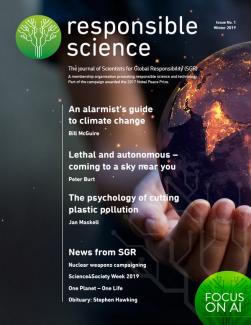Responsible Science is SGR’s new journal in which we explore some of the biggest ethical challenges facing science and technology today. It comes with membership of SGR and keeps you up-to-date with what we’re doing as an independent, membership organisation made up of hundreds of natural scientists, social scientists, engineers, IT professionals, architects, and people who are simply interested. In it you’ll read about our work to promote responsible science,design and technology, together with special features, comment and other big debates happening now.
February 2019
In issue no.1...
Feature articles
- An alarmist’s guide to climate change
Feedbacks and tipping points are being dangerously downplayed in the climate debate, argues Prof Bill McGuire, University College London. It’s time for some healthy and realistic alarmism - Cars and climate change: the need for more ambition
Prof John Whitelegg, Liverpool John Moores University, argues that major reductions in transport pollution are only achievable if we set our sights beyond electric vehicles and driverless cars. - Lethal and autonomous: coming soon to a sky near you
Dr Peter Burt, Drone Wars UK, says that, in spite of contrary assurances, the UK is developing the components of autonomous weaponry. - Prospects of robotic warfare are chilling but recognised
Prof John Finney argues that we must act to prevent the ‘morally repugnant’ prospect of machines with the power and discretion to take human life. - We need to talk about driverless cars
Perry Walker, Talk Shop, led a discussion on autonomous vehicles at the 2018 Responsible Science conference and discovered participants thinking that – whether for or against them – driverless cars don’t mix well with people. - Is artificial intelligence putting the world on steroids?
Andrew Simms, author of SGR’s briefing on AI, argues that it is likely to pile up as many problems as solve them. - The psychology of cutting plastic pollution
Dr Jan Maskell, SGR, examines the potential of behaviour change to help to reduce plastic waste. - Defence diversification: international learning for Trident jobs
Barnaby Pace, Nuclear Education Trust, explores how international examples of defence diversification programmes show what a successful programme could look like in the UK – answering concerns about employment should the British nuclear weapons programme be cancelled or curtailed. - Unaffordable and unachievable: the continuing problems of Trident renewal
Dr Philip Webber and Dr Stuart Parkinson, SGR, examine the growing financial and technical problems of renewing the UK’s nuclear weapons system. - The fall of fracking?
The future of UK fracking is delicately balanced and will send a signal about serious climate policy, says SGR’s Andrew Simms. - A man ahead of his time – How Martin Ryle saw the future of energy
In the first of two articles marking the centenary of former Astronomer Royal, Martin Ryle (1918–1984), Dr Alan Cottey describes how, early on, he saw the flaws in nuclear and fossil fuel energy and how renewables were the answer. - Martin Ryle, war and peace
Dr Alan Cottey gives a brief account of Martin Ryle's intense and complex relations with war and peace.
News from SGR
- Nuclear weapons campaigning
- Climate round-up
- Science4Society Week 2019
- Ethical careers activities
- New report shows AI in a dim light
- Military science activities
- One Planet, One Life: new SGR project
- Obituary: Stephen Hawking
Event Reviews
- SGR conference 2018 - AI: how little has to go wrong?
- Martin Ryle Trust lecture 2018 - Research and the public good
Book review
- Drawdown
